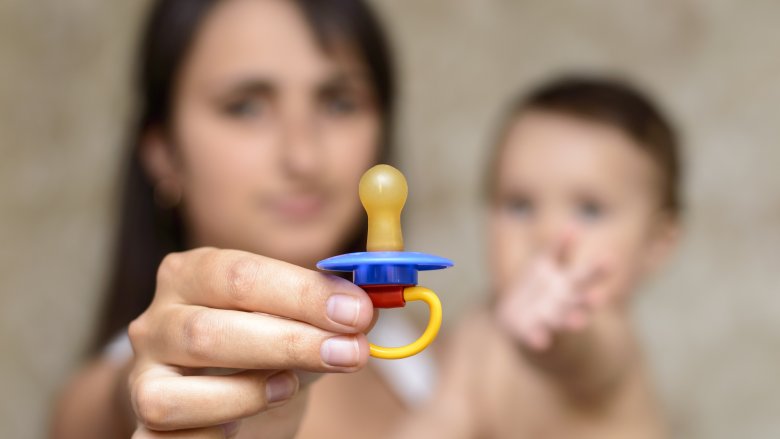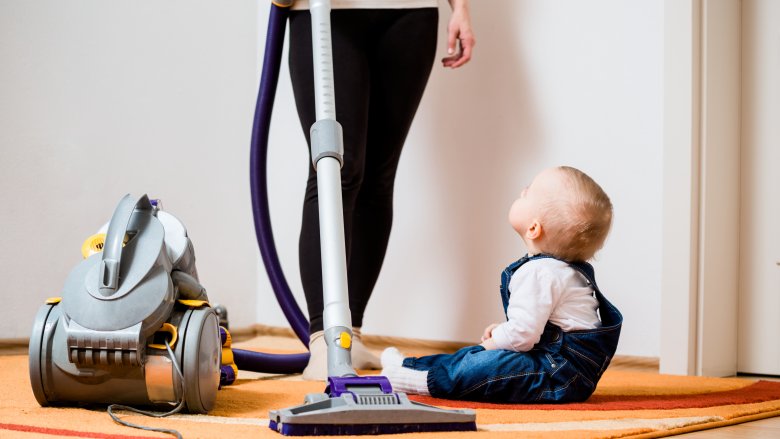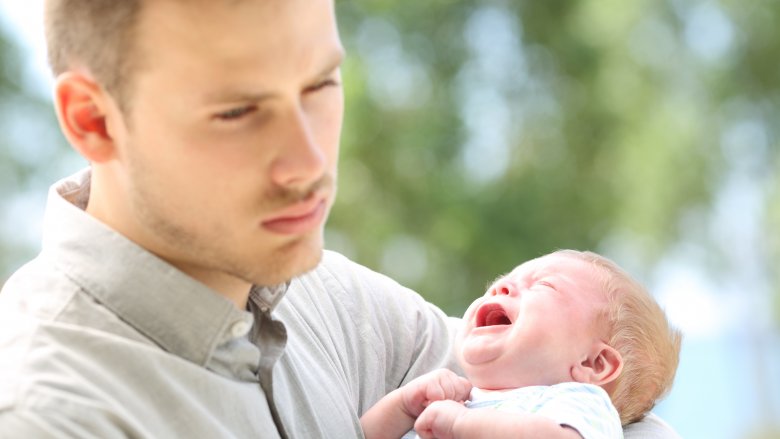Why Babies Stop Crying When Parents Do This
At some point or another, every new parent has been in this situation: Your baby is crying his eyes out and, although you feel like you've done everything in your power, nothing seems to soothe him. This can be extremely frustrating, not to mention immensely tiring — you'd give your right arm for someone to step in and tell you how to make it stop. To make matters all the more confusing, no baby is the same, meaning that at times finding the right solution can feel super overwhelming.
Fortunately, we've got your back. There are countless experts on hand to make the solution search easier, and save you from totally losing your marbles. So, we've rounded up a bunch of the most effective methods to help calm your wailing spawn. Odds are, at least one of these will effectively help your child, your sanity and your relationship with your partner (and the neighbors)! From baby massages to burrito-style wraps, you're welcome.
Get up and get movin'
It's not the best news; telling an already exhausted new parent that one of the most effective ways to calm their ever-wailing bundle is to get up and moving is a surefire way to receive a long sigh, and possibly an eye roll. But alas — nobody ever said this would be easy.
It's true, though — standing up and getting your body going has been shown to calm your baby down. "Infants under six months of age carried by a walking mother immediately stopped voluntary movement and crying and exhibited a rapid heart rate decrease," reads a 2013 Infant Calming study in Current Biology. According to the authors of the study, there's a simple reason for this: It has something to do with not wanting to be eaten alive by giant cats. Or something like that. The authors theorize that standing up makes the baby feel like it has an increased "survival probability" because its mom is ready to bolt if an "emergency escape" is required. Think of it as the earliest "fight or flight" instinct.
But, let's be honest, we care far less about the "why" than we do about the "does it work?" If you watch the video above, you'll see that it does: There's an audible and visible correlation between the babies heart rate with its mom's position. Unfortunately, this isn't an instinct you can stamp out, but at least it saves on the gym membership, right?
Sling it!
How would you like to read about a technique that not only calms your crying baby, but has also been proven to actually reduce the overall time it spends wailing? And what's more, it's something that's cheap and super easy. Yeah, we thought that might grab your attention.
You wear your kid. And no, not in a Kardashian-esque treat-your-child-like-an-accessory kind of way, but by simply popping your baby in a sling and keeping him physically close. A study by Huniziker and Barr published in Pediatrics found that "infants who received supplemental carrying cried and fussed 43% less overall, and 51% less during the evening hours." If that's not making you run to your nearest maternity-wear store, we don't know what will. The study concluded that baby-wearing can reduce normal frequency and patterns of crying in your baby's first 3 months of life.
As for why this method is so helpful, we're not entirely sure, but Dr. Sears indicates that it could be down to a more intimate connection with the parent. While baby-wearing, your baby experiences everything you experience, from your own breathing patterns, to washing the dishes. This suggest that the calmer you are while wearing your child, the calmer your baby will be.
The fold and hold
If there's anyone on this planet who is experienced with screaming babies, it's a pediatrician who has just given a shot. After all, getting a vaccination — for all their wonderful properties — is far from a pleasant experience; it's no surprise they cause infants to raise hell. However, one Santa Monica based pediatrician, Dr. Robert Hamilton, has used his experience to develop a technique that seems to calm babies down extremely quickly. He calls it "The Hold," and it's a true gift to parents everywhere.
"The Hold" starts with having your baby give himself a hug and ends with a twerk. A gentle twerk, though — you don't need some sort of newborn Nicki Minaj on your hands. You'll need to watch the video above for detailed instructions.
Dr. Hamilton claims that he's honed this technique for years and that it's an absolute godsend for calming children and "keeping them quiet." We're not sure why this technique works, and Dr. Stephen Cook couldn't explain it, either, when talking to Business Insider — we'll have to put it down to one thing: Magic!
One for the dreamers
While pacifiers might not be first on your list of "ways to get some peace and quiet" — there's no doubt that they come with some irritating habitual issues — for many, plonking one in a baby's mouth is the only way to give your ears a rest. And if you're one of those parents with a pacifier-loving newborn, Jennifer Saranow Schultz of the blog Hint Mama has a great tip for getting the most out of that paci-aided break — a hint that could mean you get a decent night's sleep!
Hint Mama (or rather, Hint Papa, as this post was penned by the blogger's husband) writes that the Dream Paci method similar to the "Dream Feed": Tiptoe into your tiny human's bedroom while he sleeps, and slide extra pacifiers into the crib. Then, when one falls out of his mouth and the little one wakes up screaming, he should find a replacement with one flail of the arms.
This has to be done while they sleep though, otherwise the baby will cotton onto your tactics! Hint Papa advises to "wait to do the dream paci until it's been at least an hour from when your little one is asleep," and then it should work "like a charm."
He kneads a massage
You don't need us to sit here and wax lyrical on the restorative powers of massage; hopefully everyone reading this has had at least one restorative pummeling in their lifetime. It may not occur to new parents, however, that babies majorly dig this TLC vibe, too — so much so that the NHS has listed it as one way to calm a crying baby.
The Mayo Clinic also enthuses about the benefits of massaging your baby, and they've penned a handy guide on how to do it correctly. As you would expect, creating a calm atmosphere is key, and you should place your baby on something comfortable yet firm. Lie your baby on his back, maintain eye contact and talk to him with a soothing voice. Then, using a gentle touch, spend about a minute on each part of his body. And fret not, if your little one isn't having a good time, they'll let you know!
The Mayo Clinic says you can use massage oils, too, just make sure they're odorless and edible, just incase some ends up in their mouths. And always do an allergy test patch first — babies can have sensitive skin!
Wrap it like a burrito, baby!
When you're feeling a little down in the dumps, does anything feel better than cocooning yourself in a warm blanket and staying inside that duvet-hug until all woes are gone? Of course not, that's about as good as it gets. Funnily enough, your lil' bambino feels the same way — so why not give them the sweet gift of swaddling on a regular basis?
According to the University of Rochester Medical Center, one hot tip for calming a crying baby is to wrap it up like a burrito (sans guacamole) in a soft blanket; tight enough so that they feel safe, but loose enough so they have a little wiggle room. There are plenty of videos online that teach you how to swaddle correctly — et voilà, your newborn is now snug as a bug in a rug. It makes sense — as Baby Center states — considering it recreates the safety, warmth and support of being inside the womb.
If you do decide to swaddle, though, there's one very important safety rule to keep in mind. Dr. Rachel Moon, chair of the task force that authored the AAP's safe sleep recommendations, told the American Academy of Pediatrics that, "if babies are swaddled, they should be placed only on their back and monitored so they don't accidentally roll over." Babies apparently start intentionally trying to roll around two months old, so it's best to get your swaddling time in before they morph from stationary burritos into sentient sausage rolls.
Let the beat drop
To paraphrase Snoop Dogg, when your baby's in the crib, ma, drop it like it's hot. And by drop it, we obviously don't mean drop your child, but rather that proverbial beat — one of the best ways to stop your child from crying is to play music. And if you think that means having to listen to the Frozen soundtrack on repeat — our sincerest apologies to the parents who do — think again. You can actually get some fun out of this one, too!
One scroll through YouTube will take you on a hilarious journey of the tracks various parents have found to subdue their spawn, from Hypnotize by Notorious B.I.G, to Katy Perry's Dark Horse, and Pharrell's Happy, to Work From Home by Fifth Harmony. While some of the lyrics in these songs may cause some parents to fret, Baby Center assures its readers that babies only start to understand some words around 13 months, which means you've got around one year to throw as many lyrical rhymes at your kid as you like.
The reasons behind this aren't clear, and different kids respond to different tunes. But there's some interesting science here — a study at Great Ormond Street Hospital (which specializes in child care) tested a group of children under the age of three who all had heart and respiratory problems. Those who listened to music for ten minutes experienced "a significant decrease in heart rate and pain level." Pretty incredible, right?
Get the housework done!
If your baby is throwing a total hissy fit, chances are the last thing you want to do is the housework — surely throwing a vacuum cleaner around your pad is just going to make matters worse, right? Not according to experts such as the NHS and the University of Rochester Medical Center, who both claim the meditative noise emitted from vacuums (and white noise in general) could be just the thing to soothe your child.
Per an article courtesy of HealthLine, which was medically reviewed by the University of Illinois-Chicago's College of Medicine, white noise can promote sleep, block out household noise, and even mimic the mother's heartbeat and womb-noise, which is especially comforting for newborns. All this being said, please be sensible with the volume — you don't want to deafen your baby!
In a since-deleted post via BabyCenter, Dr. Harvey Karp chimed in on the volume matter, stating that while some people are afraid that white noise has the potential to damage a babies' ears, it's important to keep in mind that your baby has already been exposed "to the sound of [blood] whooshing through the arteries (measured at 75-92dB)" while inside the womb. In moderation, he states, it's "perfectly safe" and "helpful in boosting sleep."
Keep your cool
Ok, ok, ok. So we know that telling you to "keep your cool" might feel about as helpful has shoving a needle in your eye. Of course it's easier said than done, but it's so important for the sake of your own mental health and your baby that you try to remain calm.
As an article via Parenting magazine describes, getting super frustrated at your screaming child will likely make matters worse: "Your infant will pick up on [your] tension and react," which can lead to a behavioral pattern that's not easy to break. The article adds that, while you can't leave a baby that's under 3 months old to cry for ages unattended, you can let them whine for five minutes — a length of time that will hopefully a) give your child time to "figure out how to soothe" themselves, and b) give you a second to breathe.
The University of Rochester Medical Center seconds this view, stating that a "stress break" is paramount if you've tried everything and your little one is still screaming blue murder. "Put your baby in a safe place (like a crib or swing) and go into a quiet room for a few minutes." Take a few minutes for yourself to calm down before returning. You've got to take care of yourself, too.
Seek professional advice
Last but by no means least, if your baby won't stop crying, it could be a sign that he's suffering from colic. According to the experts over at BabyCenter, "colic is uncontrollable crying in an otherwise healthy baby," usually in babies younger than five months old who cry "for three hours in a row on three or more days a week for at least three weeks." Oof, that's a lot of tears!
While there doesn't seem to be a direct cause for colic, it could be down to a "gassy tummy" and is usually indicated by "louder, higher pitched" cries. "Experts estimate that between eight and 40 percent of babies become colicky," and it could just be a "physical release for sensitive babies."
If you're really worried, consulting a medical professional is always a good idea, as it could eliminate other potential causes such as "intestinal problems or urinary infections." Doctors can also check that your little one is eating and growing as he should. If nothing else, they'll help you devise the best plan to cope with your stressful reality. Alternatively, services such as the National Parent Helpline provide trained professionals who are on hand to deliver support and advice should you need it.







